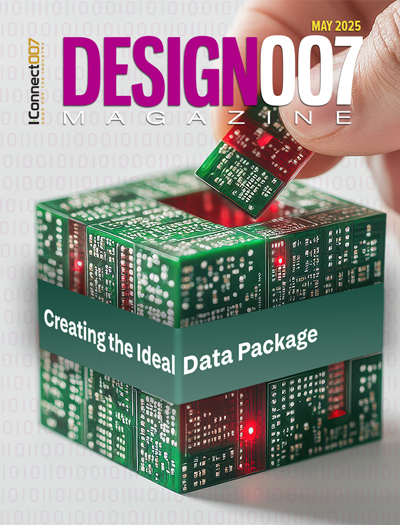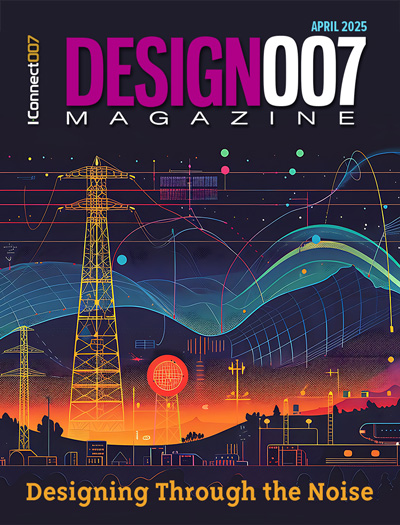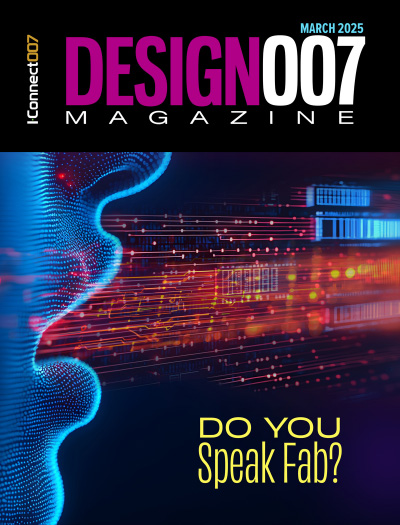-

- News
- Books
Featured Books
- design007 Magazine
Latest Issues
Current Issue
Creating the Ideal Data Package
Why is it so difficult to create the ideal data package? Many of these simple errors can be alleviated by paying attention to detail—and knowing what issues to look out for. So, this month, our experts weigh in on the best practices for creating the ideal design data package for your design.

Designing Through the Noise
Our experts discuss the constantly evolving world of RF design, including the many tradeoffs, material considerations, and design tips and techniques that designers and design engineers need to know to succeed in this high-frequency realm.

Learning to Speak ‘Fab’
Our expert contributors clear up many of the miscommunication problems between PCB designers and their fab and assembly stakeholders. As you will see, a little extra planning early in the design cycle can go a long way toward maintaining open lines of communication with the fab and assembly folks.
- Articles
- Columns
Search Console
- Links
- Media kit
||| MENU - design007 Magazine
Estimated reading time: 1 minute
The Bare (Board) Truth: Teaching the Next Generation—An Overview of Today’s University Courses
In this column, I will focus on our “home team,” if you will—the University of Washington (UW). I counted approximately 163 programs in their catalog of electronics courses. I have pulled out what I think are the most valuable for emerging electronics engineers. This does not mean the other courses are not valuable as well; in fact, I am sure I am missing some. But these are the top 19 courses I would choose if I were to start my electronics career over again.
1. Introduction to Signal Conditioning
This course requires some math courses and a basic physics course. It introduces analog circuits interfacing sensors to digital systems, including connection, attenuation, amplification, sampling, filtering termination strategies, controls and Kirchhoff’s laws, op-amps, resistors, capacitors, and inductors. This course is not intended for EE majors but would be a great help to anyone going into the tech sector.
2. Fundamentals of Electrical Engineering
As an introduction to electrical engineering, this course covers basic circuit and systems concepts, mathematical models of components, Kirchhoff's laws, resistors, sources, capacitors, inductors, and operational amplifiers as well as the solution of first- and second-order linear differential equations associated with basic circuit forms. Prerequisites are math courses and physics.
3. Circuit Theory
This course addresses electric circuit theory, analysis of circuits with sinusoidal signals, phasors, system functions, complex frequency, frequency response, computer analysis of electrical circuits, power and energy, and two-port network theory. The laboratory covers basic electrical engineering topics.
4. Digital Circuits and Systems
This course provides an overview of digital computer systems, such as logic, Boolean algebra, combinational and sequential circuits, logic design, programmable logic devices, and the design and operation of digital computers, including ALU, memory, and I/O. This course also has weekly labs that are invaluable for understanding the reality of electronics.
5. Devices and Circuits
Topics covered in this course include characteristics of bipolar transistors, large- and small-signal models for bipolar and field-effect transistors, and linear circuit applications—such as low- and high-frequency analysis of differential amplifiers, current sources, gain stages and output stages, internal circuitry of op-amps, op-amp configurations, and op-amp stability and compensation.
To read the rest of this column, which appeared in the August 2019 issue of Design007 Magazine, click here.
More Columns from The Bare (Board) Truth
The Bare (Board) Truth: My Top Six Design ChallengesThe Bare (Board) Truth: Via Basics
The Bare (Board) Truth: 5 Questions About Improving Thermal Management
The Bare (Board) Truth: Fabrication Starts With Solid Design Practices
Board Negotiations: Design Rules and Tolerances
The Bare (Board) Truth: Eliminate Confusion
The Bare (Board) Truth: Getting on the Same Page—A Data Story
The Bare (Board) Truth: Refining Output Data Packages for Fabricators


